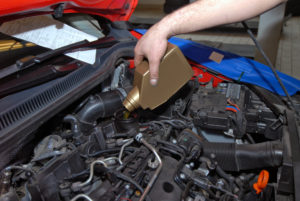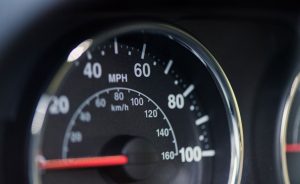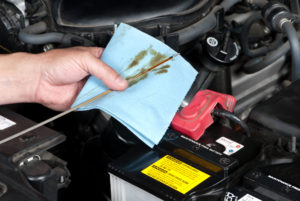Has this happened to you? You climb into your car and glance up to notice a small cling note on the inside of your windshield. It has the mileage and dates your car is due to have its next oil change. We get so used to seeing it we sometimes forget to look—but today you did.
You notice the mileage and look down at your odometer. Oops! You are a bit past the mileage mark, and the date interval as well! So, you make a mental note to call Ray’s Auto Center to schedule your oil change.
But you start thinking…
It feels like it was done recently…
You’re so busy and oil changes take a chunk out of an already packed schedule!
Why is this necessary so soon? Or,
You use synthetic oil and have been told you can go farther than 3000 miles between oil changes.
There are many reasons we tend to put off oil changes, but is it smart to do that?
Let’s look at the importance of oil changes…

- Oil lubricates the moving parts in your engine to keep them moving smoothly.
- Clean oil reduces the chances of overheating. Oil reduces friction, effectively transferring the heat throughout the engine and its parts.
- When the engine is running smoothly, it can burn off most of the contaminants and impurities caused by condensation and combustion.
- Clean oil keeps everything flowing properly so your engine doesn’t starve.
The standard guideline is oil and filter change every 3,000 miles or three months, whichever comes first. This has been the standard at Ray’s since our inception in 1954.
But, driving habits and environmental factors determine the ability of your oil to maintain its effectiveness.
- If your car is newer and your normal driving habit is trips of 20 miles or more while maintaining a steady speed, this interval works well and will keep your engine in top shape for a long time.
- If your driving habits usually involve trips that are 10 miles or less, you need to consider having your oil changed more frequently. Here’s why:
- Small trips don’t allow your engine to get hot enough to burn off condensation and impurities that can build up in the system. This accumulation can cause the oil to break down faster.
- If you aren’t driving very far, the most wear and tear on your engine is happening when you start and stop your car. This is hard on your engine.
Some other driving conditions that might indicate you should schedule your oil change more frequently include:

- Driving at low speeds for long distances
- Frequently driving on dusty, muddy, sandy or gravel roads
- Long-distance towing
- Hauling heavy cargo or materials
- Making trips of five miles or less in normal temperatures
- Making trips of 10 miles or less in freezing temperatures (especially when roads have been salted)
- Stop and go driving (lots of traffic lights are as hard on your engine as rush hour traffic)
Your oil could be fine as far as the “slippery” lubricating ability, however, whether you use synthetic or standard oil, the oil still gets dirty.
Dirty oil is where the trouble lies…

- The oil pressure system in your car has much smaller passages than older cars. If the oil is dirty from small trips or starting and stopping (like in rush-hour traffic), condensation or impurities can accumulate in your oil, reducing its viscosity. This can cause clogs or narrow the oil passageways (think of it as a cholesterol buildup in your arteries). Long-distance driving allows the engine to heat up properly and burn the contaminants out of your engine’s system.
Besides keeping your car running at its best, there are other benefits to having your oil changed at 3,000/three-month intervals:
- Regular oil changes mean a knowledgeable mechanic—who understands the entire running system of your car, not just the fluid levels—is looking at your car regularly and can catch smaller problems before they become bigger ones. (Did you know a good mechanic can tell if your oil has been changed regularly by looking at your engine?)
- Oil changes don’t just involve changing the oil and filter. You also get a knowledgeable mechanic looking at your belts, hoses, fluids, tire pressure, air filter, and coolant levels. If they are able, the mechanics at Ray’s also check your brakes and shocks for wear and life expectancy.
- Regular, documented oil changes will help eliminate a warranty void if anything should go wrong with your car while it’s under warranty.
So, even though getting regular oil changes is listed in automotive magazines as the #1 most annoying car maintenance task, you can see how important it is and why scheduling them consistently can keep your car running smoothly for many years to come.
Ray’s Auto Center has been keeping Lakewood moving since 1954. We’re dedicated to giving you the highest quality automotive services at competitive prices.
Let us keep your car in top shape by calling us today to schedule an oil change and vehicle inspection.
Remember, the most important maintenance for your vehicle is to schedule oil changes on a regular basis.

